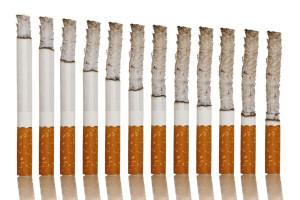The proportion of tobacco smokers is dropping in Japan, with the figure for last year down by half on that of 1989, 36 percent, according to a story in The Japan Times.
Japan Tobacco Inc. attributes the decline to increasing health awareness, an aging population, tougher smoking regulations and higher cigarette prices due chiefly to tax hikes.
According to a JT survey, the smoking rate among people aged 20 and older fell from 36.1 percent in 1989 to 17.9 percent in 2018. The proportion of smokers among adult men fell from 61.1 percent to 27.8 percent, while the rates for both men and women have hit their lowest levels since the survey was launched in 1965.
The Times said the smoking rate had continued falling since peaking in 1966, at 49.4 percent in total and at 83.7 percent for men.
Fumisato Watanabe, head of a center for information on tobacco issues, was quoted as saying that almost no public facilities had smoking regulations when he started a movement for non-smokers’ rights about 40 years ago.
But in 1987, railway stations started banning smoking in phases and later smoking became prohibited inside trains as well. In 1999, airlines banned smoking on all passenger planes.
And under the revised health promotion law that was enacted in July 2018, smoking will be prohibited in principle from April 1, 2020, at facilities that many people use, such as offices, restaurants and hotel lobbies. But such facilities will be allowed to set up special rooms, where no food or drink will be served, that can be used exclusively by smokers.
Starting on July 1, 2019, smoking will be prohibited inside all buildings at schools, hospitals and government establishments.
Ordinances with tougher regulations on tobacco smoking have been established also in some municipalities, including Tokyo and the city of Chiba.
Watanabe, 81, said the movement for non-smokers’ rights began with the wish to prevent passive smoking. “It was good that the law was revised and ordinances were established, although they are still weak,” he said.
Meanwhile, smokers have seen tobacco prices rise. In 1989, the price of a pack of JT’s Mild Seven cigarettes, the predecessor of the Mevius brand, stood at ¥220. Now the cost is ¥480.
And major cigarette makers are now focusing on heat-not-burn products. A JT official said such products smelt less and were considered to pose lower health risks than did combustible cigarettes, an idea that seems to have some official blessing. Restaurants will be allowed to set up special rooms for people using heat-not-burn tobacco products where food or drink will be served.











